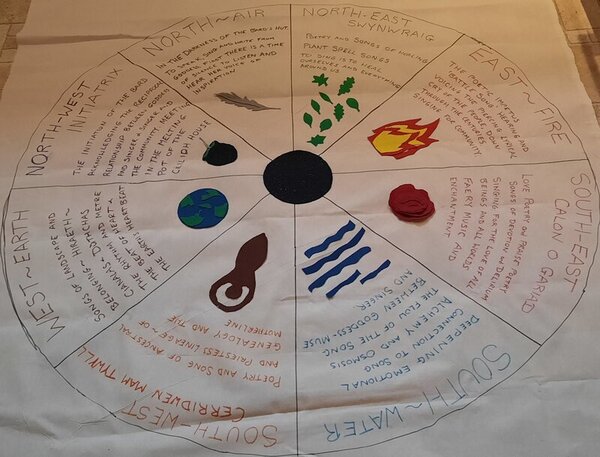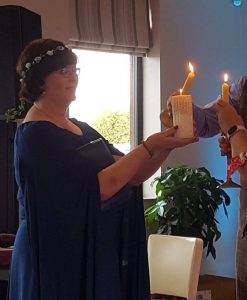A New Cycle of Songs for the Cerridwen Kin Song Wheel

In this article three Priestesses of Cerridwen; Elan, Karen and Alex talk about their love of singing and how this relates to Cerridwen’s song wheel. They share their songs with themes around shining our light and dealing with social injustice can be explored with songs. There is a beauty here with such a strong connection to the Goddess Cerridwen and our fellow human beings.
Hi everyone, as part of my continuing work with the Cerridwen Song Wheel, the weekly song offerings are a way to bring a little song magick into the world each week. I am fascinated by our native folk tradition, which I believe is a democratic tradition – folk songs belong to everyone and are a link to our lineage and the wisdom of our ancestors (and for me, Cerridwen, as Mother of Inspiration is at the heart of this).
I composed my water song, which I sing in this video, to tap into the power of water when I need connection with Cerridwen, my Lady of the Lake, especially when I can’t easily reach a loch or lake. Songs can transport us to other places and times… all we need is our voices and imagination to take us there!
![In this season of Water on Cerridwen’s Wheel of the Year, we have reached the point when summer is properly upon us; many people are turning to the thought of holidays and others are gearing up for music festivals across the country. This is the time when ‘going with the flow’ seems like a good plan! Hard work can wait for a while – perhaps ‘messing about on boats’ on the river as the Water Rat said to the Mole really is the answer. As I explore the folk song tradition through the lens of Cerridwen of Water, I am thinking of a concept, which has its source in the symbolism of water and which never fails to inspire and move me – that of the Carrying Stream. The Carrying Stream comes from a poem, composed by the Scottish folk collector, ethnologist and poet, Hamish Henderson. Should there be a name and credit here? These are words from an elegy, which he wrote for himself: Change elegy into hymn, remake it – Don’t fail again. Like the potent Sap in these branches, once bare, and now brimming With routh of green leavery, Remake it, and renew. Maker, ye maun sing them … Tomorrow, songs Will flow free again, and new voices Be borne on the carrying stream. This Carrying Stream has come to mean being part of the passing on of a tradition, mainly through music and culture. Henderson, who was one of the first folk collectors in the School of Scottish Studies in Edinburgh (a treasure house of tradition and the ‘voice of the people’ established in 1952 in George Square, at the University of Edinburgh). He knew the value of song and tradition and he travelled all over Scotland, collecting songs and stories from the people he met. He is well-known for the relationships he formed with the Traveller communities – those who were ‘Summer Walkers’ and the berry pickers of Blairgowrie. It is significant that it was often the Travelling community who were the best source of knowledge for the ‘old songs’. These people were often shunned and derided and yet it was their characteristic movement across the land (the reason for many peoples’ distrust of them) that enabled them to pick up songs from many places and carry them forward. Henderson’s ‘discovery’ of the ballad singer, Jeannie Robertson was described by Henderson as ‘the most important, single achievement of my life – the thing of which I am most proud.’ Should there me a name and credit here? She was a Traveller with a vast storehouse of traditional knowledge and song. In 1941, in Poetry and Prophecy, the archaeologist N.K. Chadwick had written that ‘among the early Celtic peoples the inculcations of poetic inspiration and the mantric art were developed and elaborated to a degree for which we know no parallel.’ Hamish Henderson believed that Jeannie Robertson was evidence that that tradition continued. Interestingly, Jeannie spoke about her ballad knowledge in the same way we often think of the learning of the Druids – through word of mouth. My Ballads? I learned them from my mother. I never learned them through books – some had been on paper – they were never learned off a paper. That’s certain. But they went from mouth to mouth in their day – the old songs – as my mother said to me. I said to her one day, ‘how did you come to learn your songs?’ ‘Well lassie,’ she says ‘I learned my songs the same way,’ she says ‘as you’re learning them’ she says ‘from me’. I learned them off my mother. The ballads… I’m singing a story when I sing a ballad – and most of them is really history. When I’m singing the song, tae tell ye the God’s truth, I picture it – just as it wis really happening. This quotation is so rich in wisdom! Jeannie Robertson perfectly describes the attributes of the Carrying Stream (and the lineage of the motherline is also interesting in this context). In her description of her process, she shows how the tradition is essentially a generous one. It has to be, or it would not survive. Thus, the songs are passed on through the generations… the river flows on. She also reveals how these songs exist for her in a sort of eternal present, with history and myth intermingling. For those of us with more than a passing interest in the story of the Goddess Cerridwen, we know how easily the eternal present works in the mouths of the Bards. Cerridwen’s story is as fresh now as it was centuries ago because it has been passed on through poetry and song. We can relate to the emotions and the events in Her story just as readily as our ancestors would have done. Hamish Henderson believed that the folk song tradition was a democratic one. Anyone can sing a song and share it with others. No one has ownership of it or takes precedence over another in this process. And, like a stream or a fast-flowing river, the song will pick up many flavours and characteristics of the places and people that it passes through. Nothing is intransigent. Everything can change and flow forward with the movement of the water. This is one reason why the folk collectors in the British Isles often found many different versions of one song. Words were changed and altered to suit different locations but, most often, the real meaning of the song remained. In other instances, new verses would be added to a song. People were not afraid to create something new from an older tradition. In our Cerridwen tradition, we practice something very similar. Our own Cerridwen song, which was first brought into being by Priestess Zindra Andersson at a Dark Moon Ritual, is added to each year – each Spiral of initiated Priest-esses compose a new verse, and so the Carrying Stream of Cerridwen’s inspiration flows on. Mother of the Darkness Mother of the Darkness, Hear our song, Mother of the Darkness, Hear our song. Take us to your cauldron, hold us when we die within. Show us what we need to see, Heal our wounds and set us free. From the darkness we find voice, Help us to accept our choice. From the cauldron we’re reborn, Hear our truth we are transformed. Bless us as we sing to you, shine your light and guide us through. Transformation makes us new, We found our light in you. Mother of the Darkness, Hear our song, Mother of the Darkness, Hear our song. Last month, we held our Avalon Cauldron Gathering in the Assembly Rooms in Glastonbury. [Cerridwen Song Brew and altar. Image Credit: Elan] During our Cerridwen Song Wheel workshop, nine Cerridwen Song Priestesses represented the aspects of the Song Wheel. These Priestesses took on the mantle of Cerridwen’s birds and the magic which was brought through that day was potent. The workshop was the culmination of a year and day (so far!) exploring Cerridwen’s Song Wheel and the part which song and music plays in our understanding of the nature of Cerridwen. She is the Goddess of the Bards and, as the different aspects of the Wheel came through, so too, did the singing of Nature’s Bards – the birds. As each of the nine took their place on the wheel – Robin, Blackbird, Hawk, Wren, Kingfisher, Nightingale, Raven, Heron and Owl – an interesting thing happened. The birds did not always stay in one place. They were quite ‘flighty’, which is perhaps understandable given their nature as creatures of air. Most significantly, another bird – the Lark – often attempted to join the nine. The Lark did this subtly, in slips of my tongue when discussing Cerridwen’s song birds. She would slip in unnoticed as I typed up notes and I would have to correct myself later. I was in no doubt that the nine birds of the Song Wheel were the right ones – I had followed signs, visions and my intuition in this process. But I also pay attention to seemingly innocent mistakes – who was this bird who seemed intent on gatecrashing Cerridwen’s ceilidh? I almost felt a little sorry for the Lark. After all, this bird is a beloved subject in numerous folk songs in Britain and Ireland. For example, ‘The Lark in the Morning’ beautifully describes the habit of the Lark who will sing at the break of day: The lark in the morning she arises from her nest And she ascends all in the air with the dew upon her breast, And with the pretty ploughboy she’ll whistle and she’ll sing, And at night she’ll return to her own nest again. Lark by Dae Jeung Kim Pixabay Larks will sing high up in the air, with their chirrups starting just after they lift off from the ground. Their sustained and complicated songs mesmerise potential mates and strengthen existing bonds between pairs. While reading Andrew Millham’s Singing Like Larks: A Celebration of Birds and Folk Songs, I chanced upon a piece of information which perhaps explains the circling of the Lark around Cerridwen’s Song Wheel: The song of the lark mimics and incorporates songs from other birds… which is no different from folk music. Traditional songs are constantly evolving, merging with each other, and one song can diverge into two entirely different entities, or three, or four! An individual will, perhaps without even thinking, alter a song in melody, rhythm and lyrics to satisfy their own personal artistry. The lark certainly does this too. The rather mischievous appearance of the Lark in the already formed Song Wheel of Cerridwen was perfectly understandable given this fact (and it was further confirmation to me that this intuitive Wheel has a basis in the natural world and holds within it an innate knowledge of the native wildlife of Her landscape). The Lark was simply mimicking the Song Wheel birds as she always does! And, by extension, I realised that the Lark is also a beautiful symbol of the Carrying Stream; like the metaphorical river of folk song, she picks songs up from others, tries them out for size, and changes them accordingly. Like Cerridwen’s rivers of inspiration, which flow through our inner and outer landscapes, we need to move with the currents, change and adapt, so that inspiration (be that in the form of song, poetry or other creative endeavours) remains fresh. Cerridwen is the Goddess of Inspiration and She is also the Goddess of Transformation. The songs of our ancestors – the ‘folk’ in folk songs – are our legacy. They belong to us. They belong to everyone. Like the Goddess who inspired their conception, they are living entities in their own right, which deserve to be honoured and respected. The greatest honour we can give a song is to sing it out into the world and pass it on to new generations. Blessed Be Elan, Priestess of Cerridwen West Lothian, Scotland Instagram: @elan_and_the_hare Elan is a scholar, writer and editor in the field of Celtic Studies. She has a PhD in Gaelic poetry and teaches university classes in Celtic culture and literature.](https://cerridwen.co.uk/wp-content/uploads/2023/06/Priestess-Elan.jpg)
Elan, Priestess of Cerridwen
West Lothian, Scotland
Instagram: @elan_and_the_hare
Elan is a scholar, writer and editor in the field of Celtic Studies. She has a PhD in Gaelic poetry and teaches university classes in Celtic culture and literature.
***************
‘By shining your light, you give others permission to shine theirs’. I love that quote! It has often encouraged me to ‘put myself out there’ against the natural inclination of some of us, (often women) to not ‘show off’ or – as grandmother’s would often say – ‘make a spectacle of ourselves’.
Knowing that I probably sound better in the shower or car, but loving singing anyway, I was honoured to take part in Cerridwen’s songwheel project, created by our Priestess Elan. Singing brings great joy (even if only to the singer ;)) but joy is infectious! Do think about joining us, and share some love, fun and music – all are needed more than ever in the World right now.
Blessings on your path, Karen (Cariad Seren)

Karen Grainger – North West, UK
“Karen Grainger lives in the North West of the UK and is a Priestess of Nemetona, ‘Daughter of Brigid’ and Priestess of Cerridwen in training, currently training with course leader, Bee Helygen.
Karen’s work is creating sacred space for others, whether that be hosting a women’s circle, death cafe, being celebrant for a handfasting or other special occasion. She is also co-founder (with Willow Moon) of Wirral Pathways Festival, which runs bi-annual online and in-person events with national and international speakers from the world of Paganism. For details see the Facebook page WirralPathwaysFestival.
Karen is owned by a white chihuahua and black cat – very yin and yang!
To contact her and for details on celebrant work, see her Facebook page Cariad Seren.
***************
Hi everyone!
I’m Alex, and I’m a Priestess of Cerridwen from Italy.
As some of you may have seen in the past weeks on our public Facebook group “Cerridwen Priestess & Priest of Avalon”, in July 2023 our kin has started a marvellous offering of songs, every Tuesday, that may be streamed live, or uploaded as a video: a beautiful idea by our beloved Sister Elan, that continues the tradition of Bee’s lovely “Sacred sounds” that she used to live stream on Facebook during Covid times!
For my turn in the Weekly Song Offering, I chose a great song called “Medicine” from Leah Song and Chloe Smith of Rising Appalachia: I particularly love it for the values it expresses, that I feel are so close to the ones of the Cerridwen Kin… not only for the love and faith in the natural world and its medicines that the Smith sisters sing of, and that obviously remind me of the beloved Wise Woman aspect of our Lady, Cerridwen Swynwraig; but also for the passion expressed in speaking up against social injustice, advocating a more egalitarian society, based on true community values – needless to say, I clearly feel Cerridwen of Fire’s energy here!
I hope you enjoy all our song offerings, sung from our hearts, in the true spirit of sharing love and beauty, and to create community!
Many blessings from Italy,
Alex

Alex, Priestess of Cerridwen
Alex La Malfa
Emilia Romagna, Italy
Instagram: @song_of_the_waves
Alex is a Priestess of Cerridwen from Italy. She has been on the path of paganism and Goddess spirituality for 20 years, and has a huge passion for herbs, crystals, painting, folk traditions and all works of reconnection with the land.